人教版丨九年级下册英语第14单元知识点总结
人教版九年级全一册英语第十四单元知识点整理

九年级英语第十四单元知识点梳理Unit 14 I remember meeting all of you in Grade 7. 短语整理•in a row 连续几次地•look back at 回首(往事);回忆;回顾•make a mess 弄得一团糟(一塌糊涂)•keep one’s cool 沉住气;保持冷静•senior high (school) 高中•junior high (school) 初中•go by(时间)逝去;过去•believe in 信任;信赖•first of all 首先•be thirsty for 渴望;渴求•be thankful to sb. 对某人心存感激•ahead of 在……前面•along with 连同;除……以外还•be responsible for 对……有责任•set out 出发;启程•separate from 分离;隔开•win a prize 获奖•do a school survey 做一个学校调查•meet the standards of … 满足……的要求/标准• a group of 一群•score two goals 踢进两个球•learn to do sth 学着去做某事•take a break 休息一下•be patient with sb 对……有耐心•work out 解出(答案);想出(解决方法)•take the time to do sth 花时间去做某事•put in more effort 更加努力•be on time 按时,准时•look forward to 期待……•have problems with … 在……方面有问题•get a … degree 取得一个……学位•be full of … 充满……的•in some way 在某种程度用法讲解•in a row 连续几次地o e.g., This is my third win in a row. 这是我连续获得的第三次胜利。
人教版九年级全册英语第14单元知识点复习提纲
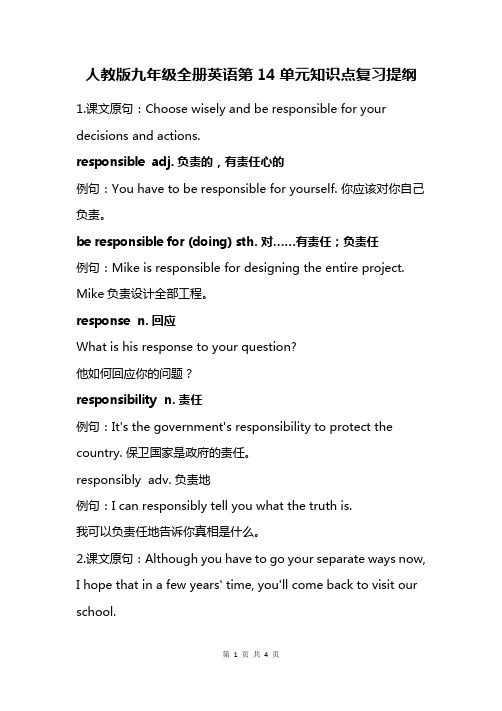
人教版九年级全册英语第14单元知识点复习提纲1.课文原句:Choose wisely and be responsible for your decisions and actions.
responsible adj. 负责的,有责任心的
例句:You have to be responsible for yourself. 你应该对你自己负责。
be responsible for (doing) sth. 对……有责任;负责任
例句:Mike is responsible for designing the entire project. Mike负责设计全部工程。
response n. 回应
What is his response to your question?
他如何回应你的问题?
responsibility n. 责任
例句:It's the government's responsibility to protect the country. 保卫国家是政府的责任。
responsibly adv. 负责地
例句:I can responsibly tell you what the truth is.
我可以负责任地告诉你真相是什么。
2.课文原句:Although you have to go your separate ways now,
I hope that in a few years' time, you'll come back to visit our school.
第1页共4页。
(完整版)人教版九年级英语第十四单元知识点总结
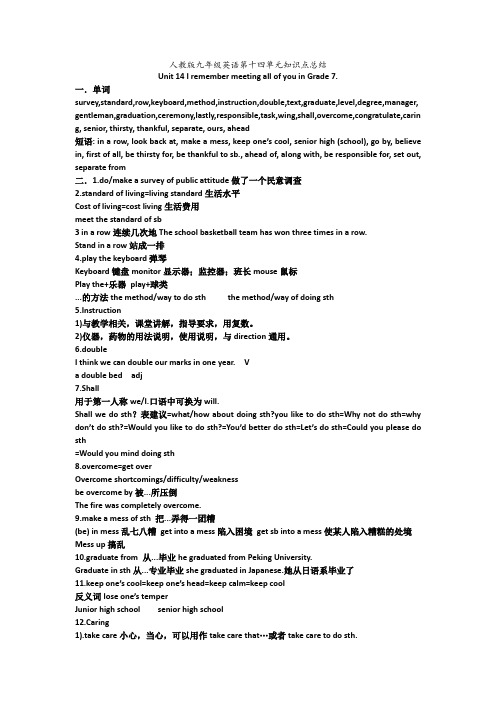
人教版九年级英语第十四单元知识点总结Unit 14 I remember meeting all of you in Grade 7.一.单词survey,standard,row,keyboard,method,instruction,double,text,graduate,level,degree,manager, gentleman,graduation,ceremony,lastly,responsible,task,wing,shall,overcome,congratulate,carin g, senior, thirsty, thankful, separate, ours, ahead短语: in a row, look back at, make a mess, keep one’s cool, senior high (school), go by, believe in, first of all, be thirsty for, be thankful to sb., ahead of, along with, be responsible for, set out, separate from二.1.do/make a survey of public attitude做了一个民意调查2.standard of living=living standard生活水平Cost of living=cost living生活费用meet the standard of sb3 in a row连续几次地The school basketball team has won three times in a row.Stand in a row站成一排4.play the keyboard弹琴Keyboard键盘monitor显示器;监控器;班长mouse鼠标Play the+乐器play+球类...的方法the method/way to do sth the method/way of doing sth5.Instruction1)与教学相关,课堂讲解,指导要求,用复数。
人教版英语九年级unit 14知识点

人教版英语九年级unit 14知识点Unit 14 Knowledge PointsIn this unit, we will explore various knowledge points covered in the ninth grade English textbook published by People's Education Press (人教版). Here, we will delve into the key concepts and ideas introduced in Unit 14. It is important to note that the format of this article will not strictly follow the textbook's layout, but it aims to effectively communicate the knowledge points in a clear and organized manner.1. Understanding CultureUnit 14 of the ninth-grade English textbook focuses on the theme of "Culture." It aims to broaden students' understanding of different cultures and promote intercultural communication. The unit covers topics such as traditional festivals, cultural exchanges, and customs from around the world.2. Vocabulary and GrammarUnit 14 also introduces new vocabulary words and grammar structures to enhance students' language proficiency. Some of the key vocabulary words include "custom," "tradition," "symbol," and "belief." These words are essential for students to comprehend the cultural concepts discussed in the unit.In terms of grammar, students will learn about the passive voice, comparatives and superlatives, and reported speech. Understanding these grammar points is crucial for students to express their ideas accurately and effectively.3. Reading ComprehensionUnit 14 provides several reading passages that aim to improve students' reading comprehension skills. These passages are designed to expose students to a variety of cultural topics, such as Chinese New Year, Thanksgiving, and the Olympic Games.Through reading and analyzing these texts, students can gain a deeper understanding of different cultures and traditions. Additionally, comprehension exercises are provided to test students' understanding of the passages and reinforce their reading skills.4. Listening and SpeakingUnit 14 places great emphasis on listening and speaking skills. Listening exercises are included to help students develop their ability to understand spoken English in various contexts. These exercises feature dialogues, interviews, and speeches related to cultural topics.To enhance speaking skills, students engage in communicative activities where they discuss their own cultures, share experiences, and give presentations on different customs. This allows students to practice expressing themselves and communicating their ideas fluently in English.5. Writing PracticeUnit 14 also provides opportunities for students to improve their writing skills by focusing on descriptive and informative texts. Students are guided to write about a cultural festival, compare traditions, or share their cultural experiences.Writing tasks in this unit promote creativity, critical thinking, and language development. By engaging in these activities, students canreinforce their writing abilities and deepen their understanding of cultural diversity.ConclusionUnit 14 of the ninth-grade English textbook published by People's Education Press offers a comprehensive exploration of various knowledge points related to culture. Through vocabulary and grammar exercises, reading comprehension activities, listening and speaking tasks, and writing practice, students can broaden their horizons and enhance their language skills.This unit serves as a platform for students to appreciate the richness of different cultures and embrace diversity. By engaging with the content in Unit 14, students can develop a global perspective and become competent communicators in the English language.。
人教版英语九年级全册单元unit14知识点+测试卷+思维导图
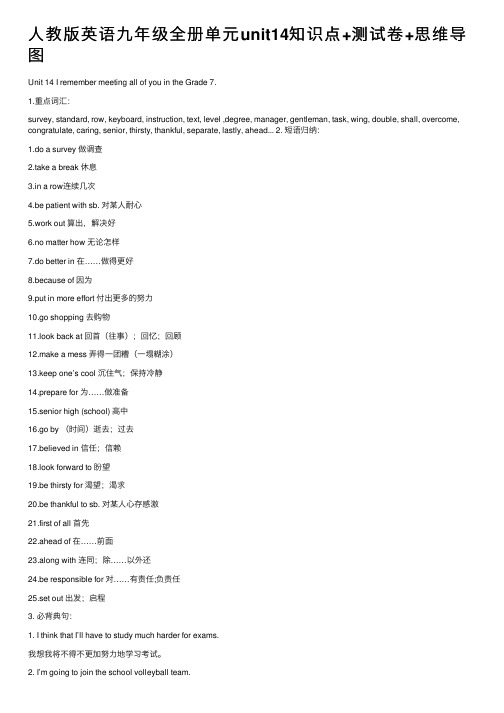
⼈教版英语九年级全册单元unit14知识点+测试卷+思维导图Unit 14 I remember meeting all of you in the Grade 7.1.重点词汇:survey, standard, row, keyboard, instruction, text, level ,degree, manager, gentleman, task, wing, double, shall, overcome, congratulate, caring, senior, thirsty, thankful, separate, lastly, ahead... 2. 短语归纳:1.do a survey 做调查2.take a break 休息3.in a row连续⼏次4.be patient with sb. 对某⼈耐⼼5.work out 算出,解决好6.no matter how ⽆论怎样7.do better in 在……做得更好8.because of 因为9.put in more effort 付出更多的努⼒10.go shopping 去购物11.look back at 回⾸(往事);回忆;回顾12.make a mess 弄得⼀团糟(⼀塌糊涂)13.keep one’s cool 沉住⽓;保持冷静14.prepare for 为……做准备15.senior high (school) ⾼中16.go by (时间)逝去;过去17.believed in 信任;信赖18.look forward to 盼望19.be thirsty for 渴望;渴求20.be thankful to sb. 对某⼈⼼存感激21.first of all ⾸先22.ahead of 在……前⾯23.along with 连同;除……以外还24.be responsible for 对……有责任;负责任25.set out 出发;启程3. 必背典句:1. I think that I’ll have to study much harder for exams.我想我将不得不更加努⼒地学习考试。
人教英语九年级下册知识点总结精讲Unit 14
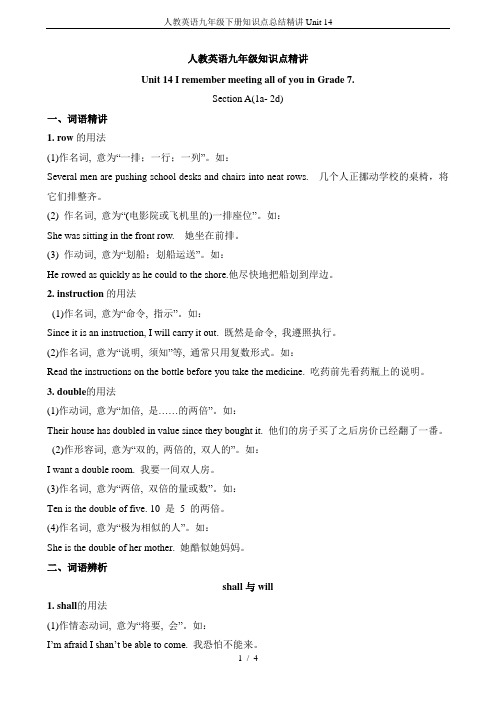
人教英语九年级知识点精讲Unit 14 I remember meeting all of you in Grade 7.Section A(1a- 2d)一、词语精讲1. row的用法(1)作名词, 意为“一排;一行;一列”。
如:Several men are pushing school desks and chairs into neat rows. 几个人正挪动学校的桌椅,将它们排整齐。
(2) 作名词, 意为“(电影院或飞机里的)一排座位”。
如:She was sitting in the front row. 她坐在前排。
(3) 作动词, 意为“划船;划船运送”。
如:He rowed as quickly as he could to the shore.他尽快地把船划到岸边。
2. instruction的用法(1)作名词, 意为“命令, 指示”。
如:Since it is an instruction, I will carry it out. 既然是命令, 我遵照执行。
(2)作名词, 意为“说明, 须知”等, 通常只用复数形式。
如:Read the instructions on the bottle before you take the medicine. 吃药前先看药瓶上的说明。
3. double的用法(1)作动词, 意为“加倍, 是……的两倍”。
如:Their house has doubled in value since they bought it. 他们的房子买了之后房价已经翻了一番。
(2)作形容词, 意为“双的, 两倍的, 双人的”。
如:I want a double room. 我要一间双人房。
(3)作名词, 意为“两倍, 双倍的量或数”。
如:Ten is the double of five. 10 是5 的两倍。
(4)作名词, 意为“极为相似的人”。
如:She is the double of her mother. 她酷似她妈妈。
人教版九年级初三英语第十四单元Unit14知识点+测试练习

⼈教版九年级初三英语第⼗四单元Unit14知识点+测试练习Unit14 I remember meeting all of you in Grade7. ⼀、短语回顾:⼆、考点解读:1.do / make a survey of public attitude _________________________2. living standard ________________________living cost ________________________meet the standard of sb. ________________________3. _______________ 说明书;使⽤说明①与教学相关,课堂讲解,指导要求,⽤复数。
②仪器,药物的⽤法说明,使⽤说明,与direction通⽤。
4. double①I think we can double our marks in one year. 【v. _____________】②a double bed 【adj. _____________________________】5. shall【⽤法】①⽤于第⼀⼈称_____ /_____。
②⼝语中可转换为_____。
【句型】Shall we do sth?(表建议)(⽤do / to do / doing填空。
)=What / How about _____ sth.?=Why not _____ sth. / Why don’t _____ sth?=Would you like _____ sth? = You’d better _____ sth.=Let’s _____ sth. = Would you mind _____ sth.?6.overcome=get over _____;_________________________ 克服弱点____________________ 战胜困难7. make a mess of sth ____________________( be ) in mess___________ get into a mess___________get sb into a mess____________________ mess up_____8. graduate from________________ He graduated from Peking University.9. go 短语:go by ___________;___________ as time goes by, ..._____________________ go ahead ___________;________;_____ go off ___________go on______;______ What’s going on here?go up______go down______go over______10. manage to do sth. = succeed in doing sth.____________________15.degree 学位;程度;度数To do this job, you must have a degree in English.从事这个⼯作你必须有英语专业的⼤学学位。
人教版九年级英语Unit14单元知识点总结
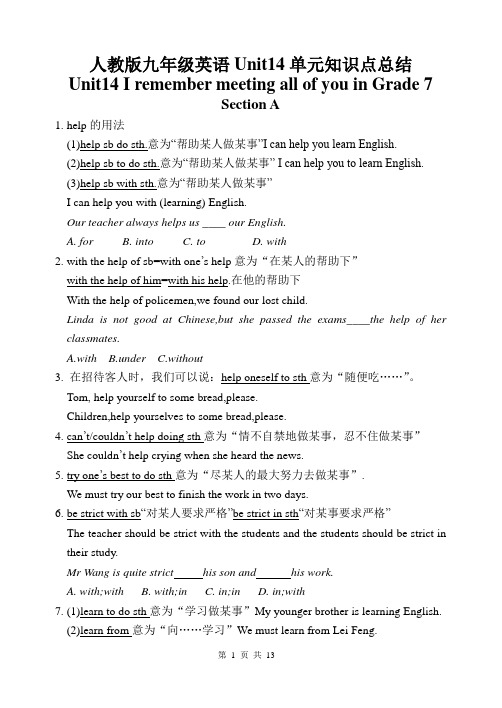
人教版九年级英语Unit14单元知识点总结Unit14 I remember meeting all of you in Grade 7Section A1. help的用法(1)help sb do sth.意为“帮助某人做某事”I can help you learn English.(2)help sb to do sth.意为“帮助某人做某事” I can help you to learn English.(3)help sb with sth.意为“帮助某人做某事”I can help you with (learning) English.Our teacher always helps us ____ our English.A. forB. intoC. toD. with2. with the help of sb=with one’s help意为“在某人的帮助下”with the help of him=with his help.在他的帮助下With the help of policemen,we found our lost child.Linda is not good at Chinese,but she passed the exams____the help of her classmates.A.withB.underC.without3. 在招待客人时,我们可以说:help oneself to sth意为“随便吃……”。
Tom, help yourself to some bread,please.Children,help yourselves to some bread,please.4. can’t/couldn’t help doing sth意为“情不自禁地做某事,忍不住做某事”She couldn’t help crying when she heard the news.5. try one’s best to do sth意为“尽某人的最大努力去做某事”.We must try our best to finish the work in two days.6. be strict with sb“对某人要求严格”be strict in sth“对某事要求严格”The teacher should be strict with the students and the students should be strict in their study.Mr Wang is quite strict his son and his work.A. with;withB. with;inC. in;inD. in;with7. (1)learn to do sth意为“学习做某事”My younger brother is learning English.(2)learn from意为“向……学习”We must learn from Lei Feng.(3)learn by oneself意为“自学”He learns French by himself.(4)learn about意为“了解,知道”The more you learn about the Chinese history,the more you enjoy living in China.8. 乐器前必须加定冠词the,球类运动前不加任何冠词。
人教版九年级英语Unit 14知识点总结

九年级英语Unit 14 I remember meeting all of you in Grade 7讲义一、词性转换Section A1. instruction→ (v.) instruct2. graduate → (n.) graduation3. caring → (v.) careSection B 4. manager → (v.) manage5. congratulate → (n.)congratulation6. thirsty → (n.) thirst7. thank → (adj.) thankful8. last → (adj.) lastly9. responsible → (n.)response10. separate → (n.) separation二、短语归纳1. do a school survey做学校调查2. meet the standard符合标准3. be patient with sb. 对某人有耐心4. take the time 花费时间5. on time 按时6. prepare for 为……做准备7. wish everyone the best 祝愿每个人万事如意8. look forward to 期待;期盼9. with one’s help = with thehelp of sb.在……的帮助下10. senior high school 高中11. look back at 回首(往事);回忆;回顾12. in a row 连续几次13. take a break 中途休息14. work out 计算出;解决15. put in more effort付出更多努力16. be proud of为……而骄傲;自豪17. make a mess 弄得一团糟18. keep one’s cool 保持冷静19. go by (时间)流逝20. at the end of在……尽头/末尾21. take dance lessons 上舞蹈课22. believe in 信任;信赖23. fail to do 未能做24. make your own choices 做出你自己的选择25. go your own separate ways分手26. in a few years’ time 几年后27. be thirsty for 渴望;渴求28. first of all 首先29. set out 出发启程30. separate from 分离;隔开31. attend the graduationceremony参加毕业典礼32. deal with 处理;对付33. be thankful to sb. 感激某人34. ahead of 在……前面35. be responsible for对……负责36.along with 连同;除……以外还1. remember doing sth. 记得做过某事2. It’s time to do sth. 该做某事了3. sb. be advised to do sth. 某人被建议做某事4. take a break from doing sth. 做某事中途休息一下5. no matter how + adj. 不管有多么……6. guide sb to do sth 知道某人做某事三、重点句子1. I remember scoring two goals in a row during a soccer competition.我记得在一次足球比赛中连续进两球。
人教版九年级英语unit14知识点总结
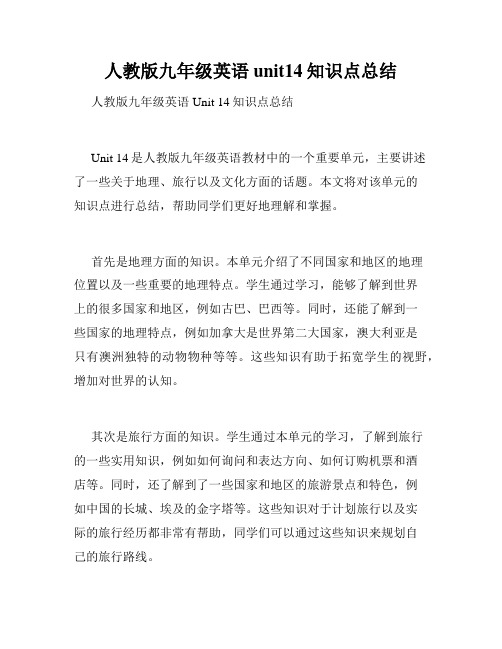
人教版九年级英语unit14知识点总结人教版九年级英语Unit 14知识点总结Unit 14是人教版九年级英语教材中的一个重要单元,主要讲述了一些关于地理、旅行以及文化方面的话题。
本文将对该单元的知识点进行总结,帮助同学们更好地理解和掌握。
首先是地理方面的知识。
本单元介绍了不同国家和地区的地理位置以及一些重要的地理特点。
学生通过学习,能够了解到世界上的很多国家和地区,例如古巴、巴西等。
同时,还能了解到一些国家的地理特点,例如加拿大是世界第二大国家,澳大利亚是只有澳洲独特的动物物种等等。
这些知识有助于拓宽学生的视野,增加对世界的认知。
其次是旅行方面的知识。
学生通过本单元的学习,了解到旅行的一些实用知识,例如如何询问和表达方向、如何订购机票和酒店等。
同时,还了解到了一些国家和地区的旅游景点和特色,例如中国的长城、埃及的金字塔等。
这些知识对于计划旅行以及实际的旅行经历都非常有帮助,同学们可以通过这些知识来规划自己的旅行路线。
最后是文化方面的知识。
本单元介绍了一些国家和地区的文化特点和传统习俗。
学生通过学习,能够了解到不同国家之间的文化差异,例如中国人对红色的喜爱程度、巴西人热衷于足球等等。
同时,还能了解到一些国家的传统习俗,例如中国的春节和美国的感恩节等。
通过了解不同国家的文化,同学们可以增进自己对世界文化的理解和欣赏。
除此之外,本单元还涉及到一些语法知识的学习。
例如比较级和最高级的用法、形容词和副词的比较等。
这些语法知识对于同学们提升自己的语言表达能力非常重要,可以帮助他们更准确地描述事物和表达自己的意思。
总的来说,人教版九年级英语Unit 14是一个涵盖地理、旅行和文化等方面内容的单元。
通过学习本单元,同学们不仅能够了解世界上不同国家和地区的一些特点,还能够提升自己的语言表达能力和综合素质。
希望同学们能够在学习中掌握这些知识,并能够将其应用到实际生活中,不断提升自己的英语水平和国际视野。
人教版英语九年级unit14知识点

人教版英语九年级unit14知识点Unit 14: Knowledge Introduced in the 9th Grade English TextbookIn the 9th-grade English textbook, Unit 14 focuses on various knowledge points that students need to understand and apply. These knowledge points cover different aspects of the English language, including grammar, vocabulary, and reading comprehension. Let's explore some of these essential points together.1. Grammar: Passive VoiceOne important grammar concept introduced in Unit 14 is the passive voice. The passive voice is used when the subject of the sentence undergoes an action, rather than performing it. For example, instead of saying "The boy broke the window," we can say "The window was broken by the boy." In this way, the emphasis is on the window, not the boy. Understanding the passive voice allows students to express ideas in a more versatile manner.2. Vocabulary: Synonyms and AntonymsExpanding vocabulary is crucial for language learning. Unit 14 includes the study of synonyms and antonyms. Synonyms are words that have similar meanings, while antonyms are words with opposite meanings. For instance, the word "brave" (synonym) can be replaced with "courageous" or "fearless." On the other hand, "happy" (antonym) can be contrasted with "sad" or "unhappy." Mastering synonyms and antonyms helps students communicate more effectively and express themselves with nuance.3. Reading Comprehension: InferenceUnit 14 also emphasizes the skill of making inferences while reading. Inference refers to drawing conclusions based on the given information and one's background knowledge. By making inferences, students can understand the implicit meaning behind the text and enhance their comprehension skills. For instance, if a passage mentions that someone is carrying an umbrella and wearing a raincoat, we can infer that it is likely raining outside. Practicing inference enhances critical thinking and helps students become more engaged readers.4. Grammar: Conditional SentencesAnother grammar point covered in Unit 14 is conditional sentences. Conditional sentences express hypothetical situations or consequences that depend on certain conditions. They consist of an "if" clause (the condition) and a main clause (the result). For example, "If it rains, I will stay at home." Understanding conditional sentences allows students to express possibilities and predictions more accurately.5. Vocabulary: Idioms and Phrasal VerbsIdioms and phrasal verbs are essential in expanding language fluency. Unit 14 introduces several idiomatic expressions and phrasal verbs. Idioms are groups of words with a figurative meaning that cannot be deciphered from their individual words, such as "break a leg" (good luck) or "hit the nail on the head" (saying something correctly). Phrasal verbs are combinations of verbs and particles, like "give up" (surrender) or "take off" (remove or depart). Learning and using idioms and phrasal verbs adds depth to students' language skills.In conclusion, Unit 14 in the 9th-grade English textbook covers a range of knowledge points that are vital for language learning. From grammar concepts like passive voice and conditional sentences to vocabulary expansion through synonyms, antonyms, idioms, and phrasal verbs, students are exposed to various language aspects.Additionally, the focus on reading comprehension skills, particularly inference, promotes critical thinking and strengthens overall language abilities. By mastering these knowledge points, students can enhance their English proficiency and communicate more effectively.。
九年级下册英语第14单元知识点

九年级下册英语第14单元知识点英语作为一门国际语言,在我们的日常生活中扮演着越来越重要的角色。
九年级下册英语第14单元是一个很重要的单元,其中包含了一些基本的语法和词汇知识。
在本文中,我将为大家详细介绍这个单元的知识点。
一、语法知识点1. 宾语从句宾语从句是复合句的一种形式,用来作为句子的宾语。
它通常由连词that引导,但在口语中可以省略。
例如:- I believe that he is a good person.(我相信他是个好人。
)- She asked me if I could help her.(她问我是否能帮她。
)2. 状语从句状语从句通常用来修饰主句中的动作或状态,表达原因、条件、目的、结果等。
常见的引导状语从句的连词有because, if, when, while, although等。
例如:- Because it was raining, we stayed at home.(因为下雨了,我们呆在家里。
)- If you study hard, you will pass the exam.(如果你努力学习,你会通过考试。
)3. 定语从句定语从句用来对主句中的名词进行修饰和限定。
定语从句通常由关系代词who, whom, whose, which, that引导。
例如:- The book which I borrowed from the library is very interesting.(我从图书馆借来的那本书很有趣。
)- The boy who is standing over there is my brother.(那个站在那边的男孩是我的兄弟。
)二、词汇知识点1. 相关词汇和短语在第14单元中,我们学习了一些与观看电影有关的词汇和短语。
例如:- actor/actress(男演员/女演员)- director(导演)- plot(剧情)- scene(场景)- special effects(特效)2. 词义辨析有时候,我们会遇到一些词义相近的词汇,但它们的用法和意义却有所不同。
人教版九年级下册英语Unit14知识点汇总
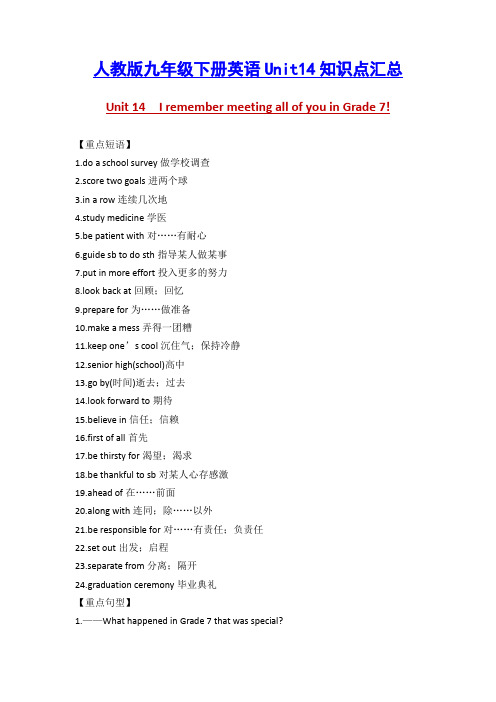
人教版九年级下册英语Unit14知识点汇总Unit 14 I remember meeting all of you in Grade 7!【重点短语】1.do a school survey做学校调查2.score two goals进两个球3.in a row连续几次地4.study medicine学医5.be patient with对……有耐心6.guide sb to do sth指导某人做某事7.put in more effort投入更多的努力8.look back at回顾;回忆9.prepare for为……做准备10.make a mess弄得一团糟11.keep one’s cool沉住气;保持冷静12.senior high(school)高中13.go by(时间)逝去;过去14.look forward to期待15.believe in信任;信赖16.first of all首先17.be thirsty for渴望;渴求18.be thankful to sb对某人心存感激19.ahead of在……前面20.along with连同;除……以外21.be responsible for对……有责任;负责任22.set out出发;启程23.separate from分离;隔开24.graduation ceremony毕业典礼【重点句型】1.——What happened in Grade 7 that was special?在七年级时发什么了什么特别的事?——Our team won the school basketball competition.我们队赢了学校的蓝球比赛。
2.——How have you changed since you started junior high school?你上中学后有什么变化?——I've become much better at speaking English.我在说英语上比以前更好。
人教英语九年级下面unit14 知识点课件

建议做某事
allow
suggestion 建议 可数
break n. 休息 暂停 take a break 休息 = have a break/ breaks
5. Someone liked Mr. Hunt's teaching methods.
有人喜欢亨特先生的教学方法。
method n. 方法,措施
2. Mrs Chen believes in all of them and tells them to “go
for it”.
陈老师相信他们所有人,并告诉他们“放手去做”。
believe/believe in 相信
believe in sb 信任某人 believe sb 相信某人的话
3. First of all, I'd like to congratulate all the students who are here today. 首先,我要祝贺今天在座的所有同学。
为····做好准备 准备做某事 为某人准备某物
16. And making a great big mess. 却弄得一团糟。
make a mess 把...弄得一团糟
in a mess 乱七八糟
get into mess 陷入困境
17. make friends with sb 和某人交朋友
18. have fun doing sth 做某事愉快
是的,你们有些人有点难对付!
deal with 对付,处理
deal with 与 how 连用;
do with 与 what 连用
6. You've all grown up so much and I'm so proud of you. be proud of = take pride in 为…感到骄傲
2021春人教版九年级英语下册 Unit 14 词句梳理
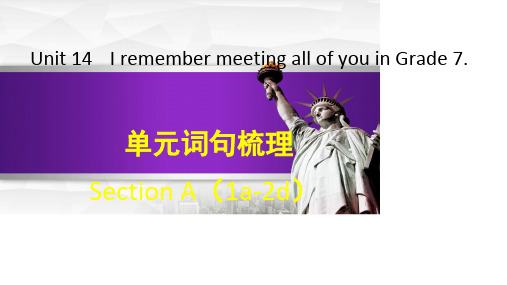
Unit 14I remember meeting all of you in Grade 7.单元词句梳理Section A(1a-2d)do a survey1. survey n. 调查→ __su__rv_e_y_s__ (pl.)→ ____________ 做一项调查2. standard n. 水平; 标准3. row n. 一排; 一列; 一行→ __i_n_a__r_o_w__ 连续几次地4. keyboard n. 键盘式电子乐器; 键盘5. method n. 方法; 措施instruct6. instruction n. 指示,命令→ ________ v. 命令;指示7. double v. 加倍; 是……的两倍adj. 两倍的; 加倍的8. shall modal. v. 将要; 将会remember doing sth.9. ______________________ 记得做过某事10. __t_a_k_e_a__b_r_e_a_k____ 休息be patient with sb.11. ____________________ 对某人有耐心必背句子12. __W__h_i_c_h__ teachers will you miss the most after junior high school, Clara?克拉拉,初中毕业后你将最想念哪些老师?Because of13. ____________ her, I put in more effort and my exam scores doubled.因为她,我付出更多的努力,并且我的考试分数翻倍。
Unit 14I remember meeting all of you in Grade 7.单元词句梳理Section A(3a-3c)1. overcome v. 克服;战胜→ _o_v_e_r_c_o_m_i_n_g_ (现在分词)overcame→___________ (过去式) → ___________ (过去分词)overcome2. caring adj. 体贴人的;关心他人的→ _m__o_r_e_c_a_r_in__g(比较级)most caring care→_____________ (最高级) →_______ v. 关心→ __c_a_r_e f_u_l_adj.仔细的;小心的→ __c_a_r e_l_e_s_s adj. 粗心的3. ours pron. 我们的( 名词性物主代词) →__o_u_r_ 我们的(形容词性物主代词) →__o_u_r_s_e_l v_e_s_我们自己( 反身代词)4. graduate v. 毕业;获得学位5. _l_o_o_k_b_a_c_k__a_t_回顾6. ______________弄得一团糟(一塌糊涂)make a messprepare for7. ___________ 准备8. __k_e_e_p__o_n_e_’s_c_o_o_l__ 沉住气;保持冷静必背句子9. I _____________ it’s been three yearscan’t believe我不能相信已经三年了。
最新人教PEP版九年级下册英语Unit 14 单元知识点归纳
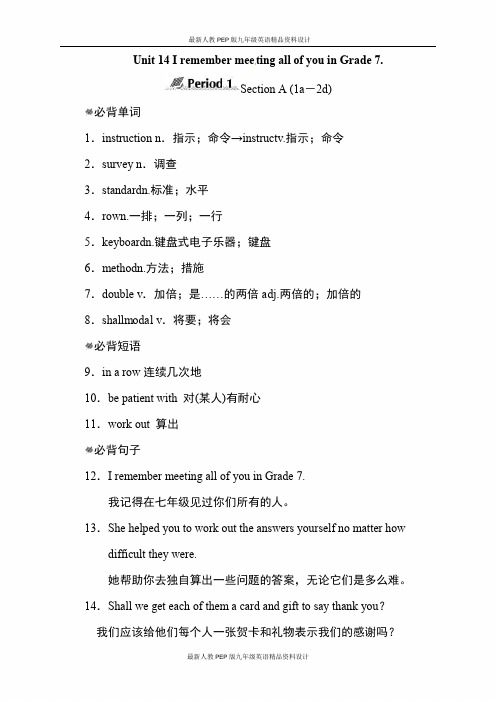
Unit 14 I remember meeting all of you in Grade 7.Section A (1a-2d)必背单词1.instruction n.指示;命令→instruct v.指示;命令2.survey n.调查3.standard n.标准;水平4.row n.一排;一列;一行5.keyboard n.键盘式电子乐器;键盘6.method n.方法;措施7.double v.加倍;是……的两倍adj.两倍的;加倍的8.shall modal v.将要;将会必背短语9.in a row连续几次地10.be patient with 对(某人)有耐心11.work out 算出必背句子12.I remember meeting all of you in Grade 7.我记得在七年级见过你们所有的人。
13.She helped you to work out the answers yourself no matter how difficult they were.她帮助你去独自算出一些问题的答案,无论它们是多么难。
14.Shall we get each of them a card and gift to say thank you?我们应该给他们每个人一张贺卡和礼物表示我们的感谢吗?Section A (3a-4b)必背单词1.overcome v.克服;战胜→(过去式) overcame →(过去分词) overcome 2.graduate v.毕业;获得学位→graduation n.毕业3.caring adj.体贴人的;关心他人的→care v.关心4.ours(名词性物主代词)我们的→(形容词性物主代词)our我们的→(人称代词主格)we我们→(人称代词宾格)us我们5.senior adj.级别(或地位)高的→junior adj.级别(或地位)低的→senior/ junior high (school)高/初中6.text n.课文;文本7.level n.水平必背短语8.look back at 回首(往事);回忆;回顾9.prepare for… 为……做准备10.make a mess 弄得一团糟(一塌糊涂)11.keep one's cool沉住气;保持冷静12.look forward to 期盼13.go by(时间)逝去;过去必背句子14.Looking back at these past three years I remember many things.回首过去的三年,我记得很多事情。
- 1、下载文档前请自行甄别文档内容的完整性,平台不提供额外的编辑、内容补充、找答案等附加服务。
- 2、"仅部分预览"的文档,不可在线预览部分如存在完整性等问题,可反馈申请退款(可完整预览的文档不适用该条件!)。
- 3、如文档侵犯您的权益,请联系客服反馈,我们会尽快为您处理(人工客服工作时间:9:00-18:30)。
人教版丨九年级下册英语第14单元知识点总结
Unit14 I remember meeting all of you in Grade 7.
【重点短语】
1. win a prize 获奖
2. do a school survey 做一个学校调查
3. meet the standard of a strict teacher 满足一位要求严格的老师的要求
4. meet this group of friends 遇到这群朋友
5. score two goals in a row 连续踢进两个球
6. learn to play the keyboard 学会弹钢琴
7. be patient with sb 对……有耐心
8. work out the answer yourself 自己找出答案
9. guide sb to do sth 指导某人做某事
10. put in more effort 更加努力
11. look back at 回首
12. pride of overcoming fear 克服恐惧感的自豪
13. make a great big mess 弄得一团糟
14. keep my cool 保持我的清高
15. try to be on time for morning reading 尽力赶上早读
16. look forward to doing sth 期望做某事
17. join the school swim team 加入学校游泳队
18. get a business degree 取得一个商业学位
【重点句型】
1. ---What happened in Grade7 that was special?
在七年级时发什么了什么特别的事?
---Our team won the school basketball competition.
我们队赢了学校的蓝球比赛。
3. ---How have you changed since you started junior high school?你上中学后有什么变化?
---I've become much better at speaking English.
我在说英语上比以前更好。
3. How do you think things will be different in senior high school?你认为在高中会有什么不同?
---I think that I'll have to study much harder for exams.
我想我将更加为考试努力学习。
4. ---What are your plans for next year? 你明年的计划是什么?
---I'm going to join the school volleyball team. 我将加入学校排球队。
5. ---What do you remember about Grade 8. 关于八年级你记得什么?---I remember being a volunteer. 我记得当一名志愿者。
6. ---What do you use to do that you don't do now?
你以前做而现在不做的事是什么?
---I used to take dance lessons, but I don't anymore.
我以前上舞蹈课,但现在不上了。
7. ---What are you looking forward to? 你期望做什么?
---I'm looking forward to going to senior high school. 我期望上高中。
【考点详解】
1. She helped you to work out the answers yourself no matter how difficult they were. 她帮助你自己算出答案,无论它们有多难。
no matter常与疑问代词或疑问副词一起构成连词词组引导让步状语从句,意为“不管……,无论……”,在运用时应注意以下几点:
(1)注意从句的时态
由no matter what/who/where/when引导的从句往往用一般现在时或一般过去时。
如:No matter who you are, you must obey the rules. 无论你是谁,都应该遵守规则。
(2)注意被修饰的名词、形容词以及副词的位置
no matter what/whose/which修饰名词时,该名词必须紧跟其后;no matter how修饰形容词或副词时,该形容词或副词也必须紧跟其后。
如:No matter how hard he works, he find it difficult to make ends meet. 无论他多么努力工作,却总是入不敷出。
(3)注意“no matter+疑问词”结构与“疑问词+ever”在用法上的区别:
①“no matter+疑问词”结构只能引导让步状语从句,这时可以和“疑问词+ever”互换。
如:No matter where he may be (=Wherever he may be),he will be happy. 他无论在什么地方都快乐。
②而“疑问词+ever”还可以引导名词性从句。
如:Give this book to whoever likes it. 谁喜欢这本书就给谁吧。
(这里不能用no matter who)
③whoever既可引导名词性从句,又有在从句中作主语、宾语、表语等;whomever也可引导名词性从句,但只能在从句中作宾语。
如:You may invite whomever you like.
2. caring adj. 体贴人的
如:I will miss the school trees and flowers and our kind and caring teachers. 我会怀念学校的树木花草以及我们善良,体贴的老师。
3. 用于go ahead, 注意以下用法:
(1)表示同意或允许,意为“说吧”、“做吧”
A:May I start? 我可以开始了吗?
B:Yes, go ahead. 好,开始吧。
(2)表示继续做某事,意为“继续…吧”
Go ahead. We are all listening. 继续讲吧,我们都在听呢!
4. As you set out on your new journey, you shouldn't forget where you came from. 当你出发踏上你的新的旅程时,不要望了你来自哪里。
set out 意为“出发;开始;陈述”。
例句:The professor sets out his ideas clearly in his article. 在这篇文章中教授清楚地表明了自己的想法。
set的用法:
(1)set about sth./doing sth. 着手做某事
如:We set about our task at once with great enthusiasm. 我们以极大的热情立即着手这项任务。
(2)set aside 放在一边,搁置;存蓄,留下
如:My parents set aside a bit of money every month. 我的父母每个月都存点钱。
(3)set off 动身,出发;燃放(鞭炮等),使……爆炸或发出响声
如:After we had finished eating, he proposed to set off immediately. 我们吃完饭后,他建议立即动身。
(4)set out 动身,出发;set out to do sth. 打算或着手做某事。
如:They set out as the sun was rising. 太阳升起时,他们就出发了。
(5)set up 竖起来,支起来;建立,成立。
如:The school has set up a special class to help slow students.
学校成立了一个特殊的班级,帮助那些后进生。
